
Follow the roads of craft villages around Hanoi (part 1)
- on Oct 29, 2020 By: BN
Hanoi city and its surroundings have more than 1300 craft villages including 276 recognized for their preserved traditional activity. We have selected for you about ten of them which, each one appreciated for its highlighted ancestral tradition, is well worth a pleasant and informative visit, in a diameter of 10 to 50 km from the capital.
The village of conical hats Chuong
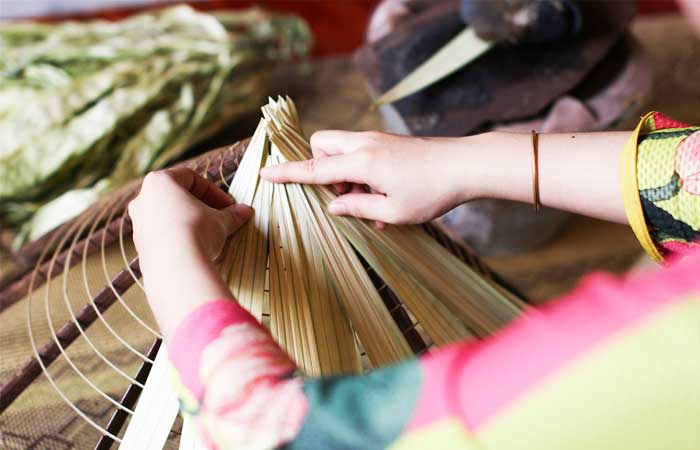
With a history of more than 300 years, the conical hat of Chuong village is part of the charm of Vietnamese women as a strong symbol of female beauty, with a famous companion, the Ao dai, the traditional Vietnamese dress. Beyond its day-to-day role, even as far back as modern times, the image of a "non la" remains an inexhaustible source of inspiration for poetry and painting. With intergenerational transmission, whether in the workshop or as a family, man or woman, old or young, you can make your first hat from about the ag of 7 or 8 years old.
The market dedicated to Chuong hats is held six times a month, falling on the 4th, 10th, 14th, 20th, 24th and 30th of the lunar calendar. It starts early at 6 a.m. and ends around 8 a.m., offering exclusively these items and related accessories. On the other hand, visitors can go to workshops all week long to buy souvenirs and attend the traditional manufacturing steps.
Location: Phuong Trung commune, Thanh Oai district, about 30 km from Hanoi
Ha Thai Lacquer Village
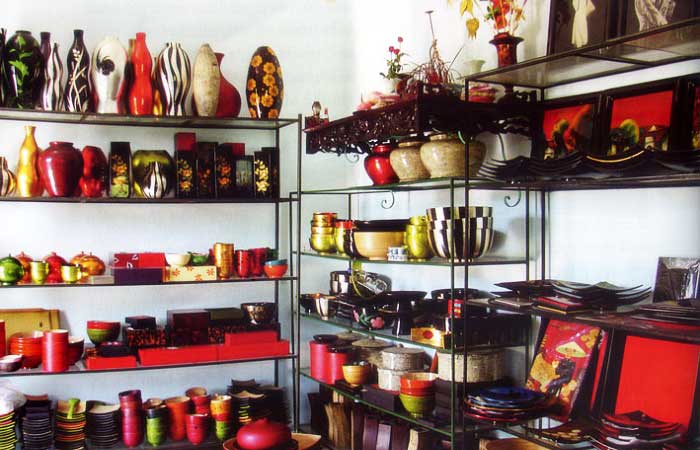
Having appeared in the 17th century, the lacquer craft in Ha Thai was used, at first, only for the production of traditional cult furniture. It was not until the 1930s of the 20th century that the more refined and varied lacquers emerged due to the intervention of the first painters of the School of Fine Art in Indochina. The artists gave life to simple lacquers by playing the card of new materials, mother-of-pearl, bamboo, eggshell… and by using meticulous techniques. Vocational training was done on-site by Mr Dinh Van Thanh, a teacher at the Indochina School of Fine Art, originally from Ha Thai, for the benefit of his villagers.
Ha Thai village enjoys a great reputation which transcends borders to convince the most demanding in many countries for a wide range of products of great aesthetics. From vases, bowls, plates, to bamboo skewers used to decorative walls and hallways. Each one proves great rigour as well as the genius of the craftsmen who in particular highlight nature and the Vietnamese countryside.
Location: Duyen Thai commune, Thuong Tin district, 17 km from Hanoi
Chang Son Woodcarving Village
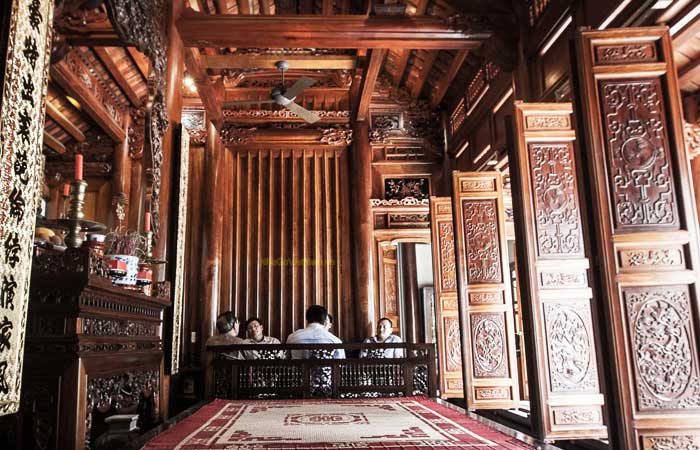
One of the oldest of the country’s craft villages, Chang Son is renowned throughout the country for its outstanding wood carving works. Legend has it that craftsmen made history in Chang Son carpentry even during the time of King Hung, the nation's founder. Many renovations to religious buildings and royal palaces across the country have been entrusted to Chang Son carpenters with incredible millennial expertise.
Initially called "Nua Chang" of which "Chang" means a tool of the trade, it was in 1956 that the village adopted its current name. The genius of Chang Son's craftsmen is wonderfully admired in the country's rarest and most original sculptures housed in Tay Phuong Pagoda. Of particular note are the statues of the 18 Arhats and the Buddha which make it an exceptional national vestige, a unique architectural museum of its kind in Vietnam.
Location: Chang Son commune, Thach That district, 35km from Hanoi
Banh chung Tranh Khuc village
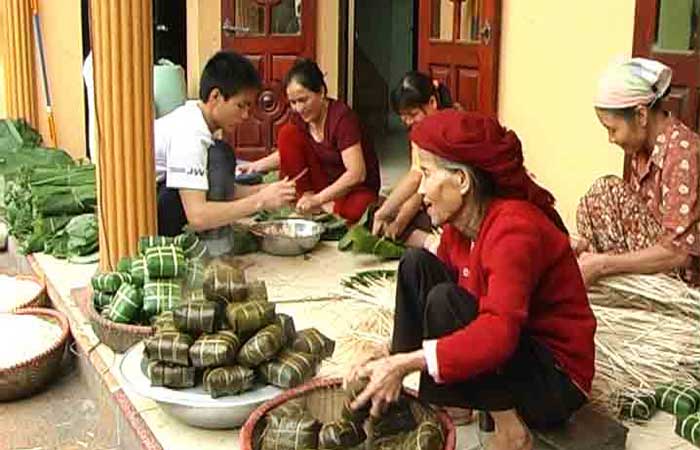
No one knows exactly when the production of Banh chung, a traditional Vietnamese cake for the Tet festival, was established in Tranh Khuc. Three-quarters of households are concentrated in this activity which has flourished for four, even five generations. In just one hour, a local is able to make 80 well-square pieces and above all without the need for a mould. A Tet offering, this sticky rice cake stuffed with pork and beansprouts requires careful preparation and cooking.
In fact, the "dong" leaves are imported from Trang Cat, its neighbouring district or even other provinces like Thanh Hoa, Lao Cai, Ha Giang and the sticky rice from the regions of Hai Hau and Nam Dinh are favoured by the families of Tranh Khuc to ensure the best quality of Banh chung.
Location: Tranh Khuc village, Duyen Ha commune, Thanh Tri district, about 10 km from Hanoi
Bat Trang ceramic village
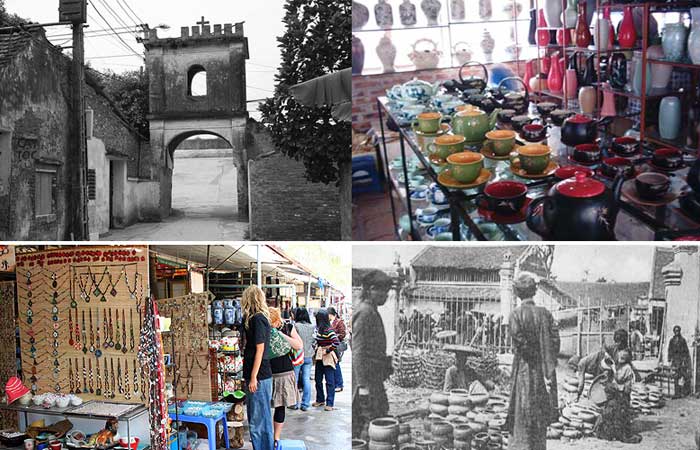
One of the best-known craft villages not far from Hanoi, Bat Trang village, whose name means a large courtyard reserved for a specialized activity, is no less than 500 years old. Its articles of all shapes and colours, popular or aesthetic, delight young and old alike. Lovers of pottery and ceramics, you will be spoiled for choice as you search for beautiful souvenirs for yourself and your loved ones. Stop by a workshop to put yourself under the skin of an apprentice ceramist or simply stroll past the kiosks and factories that are bound to tickle you. An unforgettable experience!
Location: Bat Trang commune, Gia Lam district, 14 km from Hanoi
>> We still have a list of 5 other villages to discover and to learn more about our treasures on water puppets, rattan weaving, embroidery, traditional musical instruments and silk... Read more in this article.
Comment
Other Blog
Categories
Latest News
on 27 Apr, 2023      
on 15 Apr, 2023      
on 28 Mar, 2023      
 Español
Español Français
Français



















F
on Jan 3, 2024Igor Mozetic
on Apr 8, 2023Ira Beale
on Feb 10, 2023Phạm Phú Toàn
on Jan 28, 2023Max Stover
on Jan 11, 2023